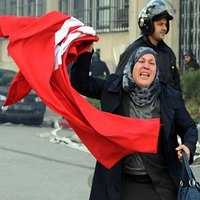Much analysis of the wave of unrest sweeping the Middle East has identified economic hardship as a crucial motivation for the uprisings. Many Middle East experts pointed to unemployment and the rising price of food in Tunisia to explain that country's uprising. The same experts pointed to unemployment and mass poverty to explain the subsequent Egyptian uprising.
But after Egyptians successfully ousted Hosni Mubarak, unrest subsequently spread to Libya, Algeria, Iran, Bahrain, Yemen and Jordan, countries with very diverse economic conditions. Standards of living in Bahrain and Libya, for example, are much higher than in Egypt and Yemen. Furthermore, the harsh economic conditions in Middle Eastern countries have existed for many years. How is it, then, that citizens of these countries have all suddenly decided to stage simultaneous mass demonstrations?
Another force is at play here, one more powerful than economic discontent: democracy envy.

